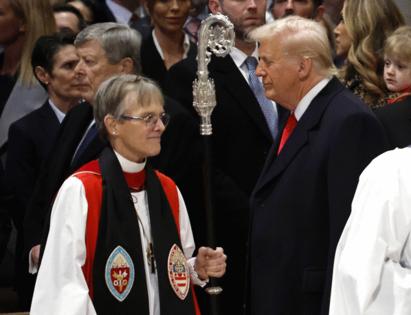Commentary: Bishop Mariann Edgar Budde's spiritual statesmanship is a model for all of us
Published in Op Eds
Historians may come to conclude that one of the most consequential moments of Donald Trump’s return to the White House took place on the first full day of his second term and in a church, not the president’s most natural milieu.
President Trump, his family and top administration officials attended an interfaith prayer service at Washington National Cathedral on Jan. 21, 2025, presided over by Bishop Mariann Edgar Budde, the Episcopal bishop of Washington.
Budde’s sermon focused on national unity, saying it requires respect, honesty and humility. Then she directed remarks to Trump about compassion. Looking the president in the eye, she urged him to have mercy on ”the people in our country who are scared now.” She cited gay, lesbian and transgender children, “some who fear for their lives.”
Budde then took aim at the essence of Trumpism. She urged mercy for “the people who pick our crops and clean our office buildings, who labor in poultry farms and meatpacking plants, who wash the dishes after we eat in restaurants and work the night shifts in hospitals. They may not be citizens or have the proper documentation, but the vast majority of immigrants are not criminals. They pay taxes and are good neighbors. They are faithful members of our churches and mosques, synagogues, gurdwara, and temples.”
The bishop concluded with a plea to welcome those escaping war and persecution. “Our God teaches us that we are to be merciful to the stranger for we were all once strangers in this land.”
Budde’s soft-spoken words appeared first to jolt, then annoy and finally rattle the president. His children looked on with palpable incredulity, perhaps learning for the first time that telling their father something he did not want to hear to his face was an option.
The most unforgettable image for me was Usha Vance, the wife of Vice President JD Vance, who looked on intently as the bishop spoke, ignoring her husband’s angry scowl. She seemed sad and stricken, as if she realized that she had somehow ended up on the side of the vengeful, not the vulnerable.
Writing later on social media, Trump said that Budde had been “very ungracious” in her sermon and “was nasty in tone and not compelling or smart.” As is often the case with the president, what he said was the opposite of the truth. Budde was indisputably gracious in her tone and both compelling and smart in her presentation.
Her spiritual statesmanship galvanized millions of Americans and modeled a way to live during the next four years — and beyond.
Budde confronted Trump before. On June 1, 2020, Trump responded to the nationwide protests over the murder of George Floyd. He held what many deemed an angry news conference in the Rose Garden and then a hastily arranged photo-op at St. John’s Episcopal Church, across from the White House, where he brandished an upside-down copy of the Bible.
“President Trump does not speak for St. John’s,” Budde told The Washington Post that day. “We disassociate ourselves from the messages of this president and align ourselves with those seeking justice for the death of George Floyd and countless others.”
She was equally forceful on CNN. “Let me be clear: The president just used a Bible, the most sacred text of the Judeo-Christian tradition, and one of the churches in my diocese without permission as a backdrop for a message antithetical to the teachings of Jesus. Everything he has said and done is to inflame violence. We need moral leadership, and he’s done everything to divide us.”
Budde’s ministry has been far more than a succession of confrontations with Trump. A trailblazing bishop, she is a forceful champion of compassion, tolerance, generosity and humility. She supports racial equity, immigration reform, gun violence prevention and environmental stewardship.
A native of New Jersey, Budde was ordained as a minister in 1989. She served as the rector of St. John’s Episcopal Church in Minneapolis from 1993 until 2011. That year she was the first woman elected as the bishop of Episcopal Diocese of Washington.
In her book, “How to Learn to Be Brave: Decisive Moments in Life and Faith,” Budde argues that bravery comes from practice. “The courage to be brave when it matters most requires a lifetime of small decisions that set us on a path of self-awareness, attentiveness, and willingness to risk failure for what we believe is right,” she writes.
Budde’s spiritual statesmanship is anchored in courage, compassion and faith. It is necessary during this fraught time in America.
By speaking directly to the president that day at the National Cathedral, Budde gave us an important example of statesmanship and citizenship. Rather than capitulate, cower or complain, we can step forward and tell the truth — even to the president’s face — calmly and insistently.
____
John T. Shaw is director of the Paul Simon Public Policy Institute. Shaw’s columns, exclusive to the Tribune, appear the last Monday of each month. His most recent book is “The Education of a Statesman: How Global Leaders Can Repair a Fractured World.”
_____
©2025 Chicago Tribune. Visit at chicagotribune.com. Distributed by Tribune Content Agency, LLC.




























































Comments